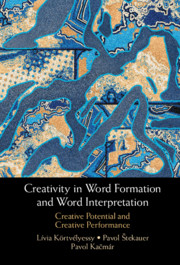Book contents
- Creativity in Word Formation and Word Interpretation
- Creativity in Word Formation and Word Interpretation
- Copyright page
- Contents
- Figures
- Tables
- Acknowledgements
- 1 Introduction
- 2 On the Notion of Creativity
- 3 Theoretical Foundations of Our Research
- 4 Methodological Principles
- 5 Research
- 6 Conclusions
- References
- Author Index
- Subject Index
4 - Methodological Principles
Published online by Cambridge University Press: 20 January 2022
- Creativity in Word Formation and Word Interpretation
- Creativity in Word Formation and Word Interpretation
- Copyright page
- Contents
- Figures
- Tables
- Acknowledgements
- 1 Introduction
- 2 On the Notion of Creativity
- 3 Theoretical Foundations of Our Research
- 4 Methodological Principles
- 5 Research
- 6 Conclusions
- References
- Author Index
- Subject Index
Summary
Since the objective of our research is to examine the influence of the creative potential of language speakers on their creative performance in the formation and interpretation of new/potential complex words, there are several fundamental methodological principles that have to be taken into consideration. First of all is the method of measuring the creative potential of language speakers and the methods of testing their creative performance Therefore, this chapter introduces the Torrance Test of Creative Thinking, accounts for the basic characteristics of creativity indicators and subscores, and justifies its relevance to our research. Furthermore, it presents a word-formation test and a word-interpretation test and accounts for their objectives and principles of evaluation. A sample of respondents, comprising a group of secondary school students and a group of university students, is introduced. A method of evaluating the data is explained, based on the comparison of two cohorts with opposite scores. Finally, this chapter presents the hypotheses underlying our research.
Keywords
- Type
- Chapter
- Information
- Creativity in Word Formation and Word InterpretationCreative Potential and Creative Performance, pp. 53 - 77Publisher: Cambridge University PressPrint publication year: 2022

